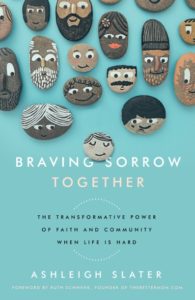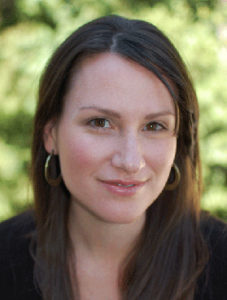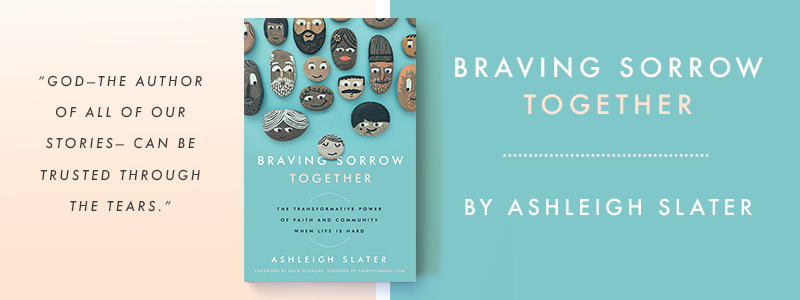I’m so honored to host my friend and fellow author Ashleigh Slater today. Her book, Braving Sorrow Together, released last week, and I love her unique lens on heartache and pain and how we can support each other through it.
The Bible application she’s sharing today is actually the first Scripture you’ll find in my book, Prayers for Hope and Healing. Pretty sure that’s not an accident…I love how God works!
Whatever challenge you’re facing, I pray Ashleigh’s words bless you.
Are you familiar with the New Testament story of the woman with the issue of blood?
This woman intimately understood what it was like to suffer a chronic illness, yet remain hopeful. Her account is recorded in three of the four Gospels, and in all of them, she’s unnamed.
We’re told that she’d been hemorrhaging for twelve years. I can’t imagine enduring a period that lasted for over a decade, yet that was this woman’s daily reality.
What further complicated her situation is that in that culture and era, Jewish law restricted her from public settings. As a result, the bleeding not only affected her physical body, it also impacted her relationships and impeded her mobility. She was most likely a shut-in because her chronic illness isolated her from society.
Understandably, this woman was determined to find a cure. Tragically, though, no one was able to help her.
No one, that is, until Jesus.
I can’t help but think that for this woman, Jesus was her last chance to be restored. Mark writes, “She heard about Jesus, so she came up behind him through the crowd and touched his robe. For she thought to herself, ‘If I can just touch his robe, I will be healed’” (Mark 5:27 NLT).
And just like that, she was.
Her hope—and her faith, Scripture notes—paid off. In that moment, her narrative changed; her suffering ended.
Let’s not forget, though, that it took twelve years for her to reach that juncture, that turning point. There were twelve years of illness and suffering. Twelve years of isolation and social stigma. Twelve years of botched procedures and unending medical bills.
Perhaps your current situation is a twelve-year one too. Maybe not literally, but metaphorically. Like the woman with the issue of blood, prolonged illness plagues you. As a result, there’ve been weeks, months, even years of pain, isolation, and weariness. Or possibly your health struggle is a new one, and you’re grasping to make sense of it.
Whatever your present circumstances are, here are two encouragements we can all take away from this woman’s story.
Put Hope in God
The woman with the issue of blood demonstrates for you and me what it means to never give in, even when it seems the odds are against us. Her story challenges us to place our hope—our full trust and reliance—in the eternal goodness of God, and not in the current discouraging condition of our physical bodies.
Think about her life up to this point. It would’ve been reasonable for this woman to have responded to Jesus with skepticism and cynicism. She’d already placed faith and confidence in multiple doctors and they’d all let her down. But she didn’t. Instead, she approached Him with hopeful anticipation, and in doing so, she invited Him into her suffering. We can do the same.
When I invest my hope in God regardless of whether my health improves or not, I can take some comfort in the truth that I don’t brave my sorrow alone. Instead, I venture through suffering with a God who’s described as “the Father of mercies and God of all comfort” and who is faithful to console “us in all our affliction” (2 Cor. 1:3, 4).
Reach Out to Others
A characteristic I love about this woman is she wasn’t passive. She didn’t wait at home for Jesus to miraculously knock on her door. Instead, she left her comfort zone and reached out to Him.
Her story reminds me, and hopefully you too, to be brave enough to reach out, not only to Jesus, but to others.
But what does it mean to be brave enough to reach out like the woman with the issue of blood?
Reaching out doesn’t necessarily mean my life or yours becomes a tell-all book. We don’t have to disclose our health losses on social media, to everyone we attend church with, or to all of our extended family, unless we want to. We can reach out and still exercise discretion, as well as maintain a level of privacy.
What it does mean is that we don’t conceal our suffering in a way that further isolates us from those closest to us. Rather, we invite them to pray for us, encourage us, and physically and emotionally be there for us.
When we muster the strength to rely on God and others during difficulty, we invite them to share in our hardship, to fight alongside us as we battle fear and discouragement, pain and uncertainty. We give others the opportunity to—as Jesus did for this woman—change our narrative.
This article is adapted from Ashleigh Slater’s new book, Braving Sorrow Together: The Transformative Power of Faith and Community When Life Is Hard from Moody Publishers, 2017. Used with permission.
About the Author
 Ashleigh Slater is the author of the books, Braving Sorrow Together: The Transformative Power of Faith and Community When Life is Hard and Team Us: The Unifying Power of Grace, Commitment, and Cooperation in Marriage. She loves to combine the power of a good story with practical application to encourage and inspire readers. Learn more at AshleighSlater.com.
Ashleigh Slater is the author of the books, Braving Sorrow Together: The Transformative Power of Faith and Community When Life is Hard and Team Us: The Unifying Power of Grace, Commitment, and Cooperation in Marriage. She loves to combine the power of a good story with practical application to encourage and inspire readers. Learn more at AshleighSlater.com.
About Braving Sorrow Together
How do you cope when life is hard? Is there a way to grieve so that seasons of loss become seasons of growth? Braving Sorrow Together: The Transformative Power of Faith and Community When Life is Hard is about where to turn when life is hard. Ashleigh Slater weaves together Scripture, personal stories, and guest entries to comfort the suffering and encourage hopeful grieving. Whether your trials concern health, employment, relationships, or even death, grief can turn into growth when we lean on Christ and others. Braving Sorrow Together provides solace for hard times and advice for getting through them with grit and grace.
*title and quote photos by Jana at Twigy Posts


